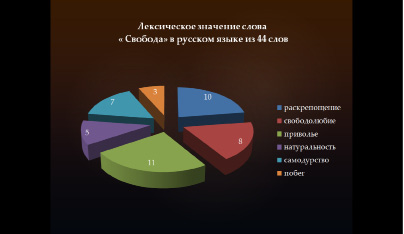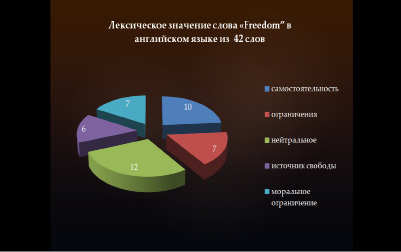Nowadays it is very important to know foreign languages. Some people learn languages, because they need them for their work, others travel abroad, for the third it`s just a hobby. People want to know languages, to write to their pen-friends or to communicate with people from different countries, to meet more people and make new friends. Also, they want to read books of famous writers in original, to read newspapers and magazines. I want to understand. Can we translate some several of words and phrases correctly? Do we make mistakes when we replace one lexical meaning to another?
One day, our teacher of history spoke about similarities and differences the word «freedom» among Russian and English people. I decided to know about it more.
The aim of my research:
• fill gaps of knowledge in the ability to translate texts and understand people during communication correctly;
• development of knowledge and application in further education ;
• summary of experience.
• try to compare words «freedom» in the English and Russian languages
The object of study – comparative analysis of the units «freedom» and «свобода»
The subject of the research is synonyms. They match in their meanings – freedom, independence in the Russian language and words freedom, liberty, license, independence in English.
The tasks:
– to select the units belonging to the words «freedom» in the English and Russian languages;
– to analyze these lexical items;
– to find cultural and social differences
The methods:
– theoretical: theoretical analysis of literary sources, dictionaries;
– empirical: observation, generalization
Theoretical part №1
From early childhood, I have been interested by the English language. I read, learned poems, sang songs, translated texts and had the dialogues to each other. Then I had begun to face some special difficulties in language. It was the difficulty of translating and understanding of native speakers.
I decided to work with the words – freedom, independence, self-dependence, volition in the Russian language and the words: freedom, liberty, license, independence in English.
All these words can be translated in one word «freedom» but everything is not as simple as it seemed. I have been working with dictionaries for a long time. Such as:
– Explanatory dictionary of the Russian language. Author V. Dahl
– «Dictionary of the Russian language», edited by S. Ozhegov
– «Large Dictionary of Russian Jargon» by V.M. Mokienko
– The Dictionary of Antonyms of the Russian Language,
I find out 44 words in the Russian dictionaries:
Freedom from the point of view of philosophy has 4 meanings:
– ability to express one’s volition Is based on the laws of nature and society;
– independence, lack of constraints and restrictions in social and political life;
– absence of many restrictions in anything;
– to be in prison, in captivity.
Independence has 2 meanings:
– independence, not being in submission, freedom;
– political independence, lack of subordination, sovereignty;
Self-dependence has 3 meanings:
– existence separate from others, independence;
– having your own initiative;
– ability to be made by own forces, without influences, without another’s helping.
Volition has 2 meanings:
– freedom in everything;
– free status, not in prison, not locked up.
Then I decided to combine all the concepts and divided them into groups. I have got this diagram. (supplement 1)
1. emancipation, (10 units were found in the dictionaries)
2. love of freedom ( 5 units);
3. freedom (11 units);
4. independence (8 units)
5. tyrannies, powerlessness (7 units)
6. amnesty, escape from prison, colony, army. (3 units)
Pay attention to the diagram. It can be concluded that the Russian culture, and the Russian language, have double meanings the word freedom. On the one hand, freedom is the natural status of the Russian soul (29 units) on the other it`s a negative quality which in most cases must be suppressed (15 units).
Andrey Konchelovskiy said: – «Свобода есть великий дар, но не абсолютное благо. Она может быть опасна. Для русского человека она едва ли не опаснее, чем атомная энергия… Свобода для русского человека всегда была синонимом слова «воля»: что хочу, то и ворочу. И это сохранилось…»
Theoretical part №2
I continued to work with the word «Freedom» which is based on the English dictionaries: such as
– Merriam-Webster’s Collegiate Dictionary;
– Dictionary of English Synonyms;
– Oxford Advanced Learner’s Dictionary and the Dictionary of Modern Slang.
I selected 42 words –synonyms– freedom, liberty, license, independence.
Freedom has 4 meanings:
– quality or state of being free;
– absence of necessity, constraint in choice or action;
– restraint or from the power of another;
– political right.
Liberty has 4 meanings:
– power to do as one pleases;
– freedom from arbitrary or despotic control;
– positive enjoyment of various social, political, or economic rights and privileges;
– power of choice.
License has 2 meaning:
– the power or condition of acting without compulsion;
– freedom that allows or is used with irresponsibility.
Independence has 3 units:
– not affiliated with a larger controlling unit;
– being enough to free one from the necessity of working for a living;
– showing a desire for freedom.
I decided to unite them into groups too:
1 – independent, legal freedom, escape, come-off, – (10 units were found in total);
2 – liberty – is based on the law (only 7 units);
3 – correctness, need (neutral «total 12 units);
4 – «moral limitation» strain, abandon, (only 6 units);
5 – source of restrictions / source of freedom – wild (7 units)
Look at this diagram .There are a lot of units with a neutral attitude to freedom. The prevalence of concepts is based on legislation. (Supplement 2)
So, freedom for a Western person is associated with the certain rights which they are established by the law. And freedom in Western culture is directly connected with the law.
Conclusion
1. During my work I understand that «freedom» has a huge number of different translations and different interpretations. I understand that this attitude is connected with the history of people.
2. In Russian language there aren`t a lot of words in which have neutral attitude to the concept of freedom. But in the English language there are many units with neutral attitude. What is suitable for Russian not suitable for British?
3. In both languages, there are many words of freedom. But they are different. In the Russian language the absolute majority of words include the lexical units of «limitations coming from outside». In the English language – «limitations coming from within».
4. In the Russian language freedom is associated with the vast territory. In English, the word freedom is not related to territory.
The theoretical meaning of my work lies in the differences of both languages. I believe that you cannot correctly translate many words without knowing of the culture and history.
The practical meaning is based on the helping schoolchildren to raise the educational level.
Supplement 1

Supplement 2

Библиографическая ссылка
Алексанкина В.С. СРАВНИТЕЛЬНЫЙ АНАЛИЗ СЛОВ «СВОБОДА» И «FREEDOM» В РУССКОМ И АНГЛИЙСКОМ ЯЗЫКЕ. // Старт в науке. 2019. № 3-1. ;URL: https://science-start.ru/ru/article/view?id=1559 (дата обращения: 03.03.2026).
